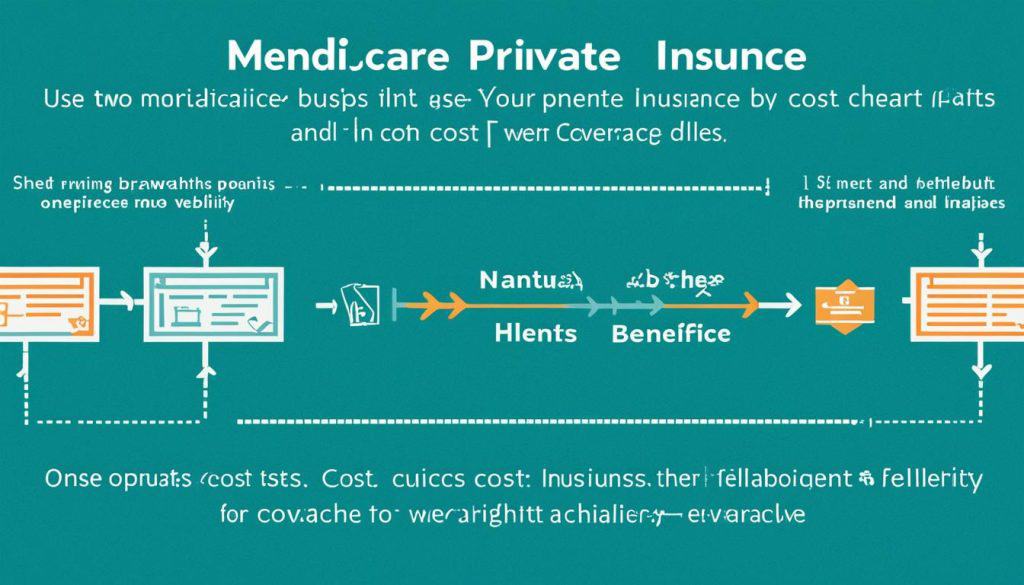If you’re nearing retirement age or experiencing changes in your healthcare needs, you may be considering your options for insurance coverage. With Medicare and private insurance being the two primary choices for older adults in the United States, it’s crucial to understand the differences between the two and which may be the best fit for you.
In this section, we’ll explore the costs and benefits of Medicare and private insurance coverage. Understanding the options available can help you make an informed decision about your healthcare and ensure you have the adequate coverage you need.
Key Takeaways:
- Medicare and private insurance are the two primary options for older adults in the United States.
- Understanding the costs and benefits of each can help you choose the best coverage for your needs.
- Integrity Now Insurance Brokers is an independent Medicare insurance agency that is here to help you make an informed healthcare decision.
Understanding Medicare
Medicare is a federal health insurance program designed primarily for people 65 years and older, younger people with disabilities, and people with End-Stage Renal Disease (ESRD).
To be eligible for Medicare, you must meet certain criteria such as being a U.S. citizen or permanent resident and having worked long enough to qualify for Social Security or Railroad Retirement benefits. Medicare coverage options include Original Medicare, Medicare Advantage, and Medicare Supplement plans.
Original Medicare
Original Medicare is comprised of two parts: Part A (Hospital Insurance) and Part B (Medical Insurance). Part A provides coverage for inpatient hospital care, skilled nursing facility care, hospice care, and home health care. Part B provides coverage for doctor visits, preventive care, and medical equipment.
Medicare Advantage
Medicare Advantage (Part C) offers an alternative to Original Medicare. These plans are offered by private insurance companies and provide the same coverage as Original Medicare (Parts A and B) along with additional benefits such as prescription drug coverage, vision, dental, and hearing coverage.
Medicare Supplement Plans
Also known as Medigap, Medicare Supplement plans are sold by private insurance companies to help cover some of the costs that Original Medicare doesn’t cover, such as deductibles and coinsurance.
Enrolling in Medicare can be an overwhelming process. It’s important to understand your options and choose the coverage that best suits your healthcare needs. Integrity Now Insurance Brokers, an independent Medicare insurance agency, can help guide you through the enrollment process and provide unbiased advice on choosing the right Medicare coverage for you.

Employer-Sponsored Plans
Employer-sponsored plans are insurance plans offered by a person’s place of employment. These plans are often cheaper than other private insurance options because the employer may pay for part of the premium. Some employers may offer different coverage options to choose from, such as a PPO or an HMO.
Individual Plans
Individual plans are insurance plans that a person can purchase on their own. These plans are often more expensive than employer-sponsored plans but may still be a good option for those who are self-employed or do not have access to employer coverage.
Marketplace Plans
Marketplace plans are insurance plans that can be purchased on the federal or state health insurance marketplace. These plans provide coverage for essential health benefits, like doctor visits, preventive care, and prescription drugs.
Comparing Costs of Medicare and Private Insurance
When considering healthcare coverage options, cost is often a significant factor to keep in mind. In this section, we’ll take a closer look at the costs associated with Medicare and private insurance.
Medicare costs vary depending on the type of coverage you choose. For Original Medicare, there is typically no monthly premium, but there are out-of-pocket costs such as deductibles and coinsurance. Medicare Advantage plans have monthly premiums, but they may provide additional benefits such as prescription drug coverage and lower out-of-pocket costs. Medicare Supplement plans are designed to fill in the gaps of Original Medicare and may have higher premiums but lower out-of-pocket expenses.
Private insurance premiums and deductibles vary depending on the plan you choose. Employer-sponsored plans may have lower premiums and deductibles than individual or marketplace plans. In general, private insurance premiums tend to be higher than Medicare premiums, but may provide more coverage options and fewer out-of-pocket costs.
To help illustrate the differences between Medicare and private insurance costs, we’ve included a table below:
| Cost Type | Medicare | Private Insurance |
|---|---|---|
| Monthly Premiums | Varies by Plan | Varies by Plan |
| Deductibles | Varies by Plan | Varies by Plan |
| Copayments | Varies by Service | Varies by Plan |
| Coinsurance | Varies by Service | Varies by Plan |
As you can see, there are several factors to consider when comparing the costs of Medicare and private insurance. Understanding these costs can help you make an informed decision about which healthcare coverage option is best for you.

Additional benefits are available through Medicare Advantage and Medicare Supplement plans. Integrity Now Insurance Brokers, an independent Medicare insurance agency, can guide you through the Medicare coverage options available and help you choose the plan that meets your unique healthcare needs.
Benefits of Private Insurance
Private insurance coverage offers several benefits compared to other healthcare plans. Along with providing the ability to select a customized plan that fits your personal needs and budget, private insurance plans often include additional perks that promote overall wellness and provide access to a wider network of healthcare providers. Some of the benefits of private insurance coverage include:
- Wellness Programs: Many private insurance plans offer programs designed to improve your overall health and prevent future health issues. These programs may include free gym memberships, access to nutritionists, and smoking cessation programs.
- Dental and Vision Coverage: Unlike Original Medicare, many private insurance plans include coverage for routine dental and vision care. This coverage can help manage the costs of routine checkups and preventative care.
- Access to a Broader Network of Healthcare Providers: Private insurance plans offer flexibility in selecting healthcare providers. With private insurance, you can typically choose providers outside your network, allowing for broader coverage and more personalized care.
When selecting a private insurance plan, it’s essential to understand the benefits and limitations of each plan type. An independent Medicare insurance agency like Integrity Now Insurance Brokers can provide expert guidance and support in selecting the right plan for your unique healthcare needs.

Factors to Consider in Choosing Between Medicare and Private Insurance
Deciding on the right healthcare coverage can be a daunting task. With so many variables in play, it’s important to weigh all the factors carefully before making a decision. Here are some primary factors to consider when choosing between Medicare and private insurance:
- Medicare Eligibility: Medicare is available for most Americans over the age of 65. It’s also available for those under 65 with certain disabilities or end-stage renal disease. If you don’t meet these requirements, private insurance may be your only option.
- Existing Health Conditions: If you have pre-existing health conditions, you’ll want to carefully consider which type of coverage will provide the best care and treatment for your needs. Private insurance may offer broader coverage options, including specialists and alternative treatments that may not be covered under Medicare.
- Personal Preferences: Personal preferences can also play a significant role in your decision. If you prefer to choose from a wider range of healthcare providers, private insurance may be the better option. If you value the predictability and stability of a government-run program, you may prefer Medicare.
- Financial Considerations: The costs of Medicare vs private insurance can vary significantly and should be a primary consideration. While Medicare premiums may be lower, you may incur higher out-of-pocket costs, including deductibles and copayments. With private insurance, premiums may be higher, but you may have lower out-of-pocket costs for medical services and prescription drugs.
Switching from Private Insurance to Medicare
If you are considering switching from private insurance to Medicare, it’s important to understand the implications. Once you enroll in Medicare, you may not be able to switch back to private insurance without penalty. In addition, Medicare may not cover all services and treatments that were covered under your private insurance, so it’s important to carefully consider the tradeoffs.
Switching from Medicare to Private Insurance
If you are considering switching from Medicare to private insurance, you may be able to do so during the annual enrollment period. However, you’ll want to carefully consider the tradeoffs, as private insurance may not provide the same level of coverage and benefits as Medicare. It’s also important to note that switching from Medicare to private insurance may impact your ability to enroll in Medicare Supplement (Medigap) policies.
Medicare vs Private Insurance: Pros and Cons
When considering healthcare options, it’s important to carefully weigh the pros and cons of both Medicare and private insurance. Here, we break down the advantages and disadvantages of each:
Medicare Pros:
- Medicare is a federal program that provides coverage to those over the age of 65, regardless of pre-existing conditions.
- Original Medicare covers essential medical services such as hospital stays, doctor visits, and medically necessary equipment.
- Medicare Advantage plans may offer additional benefits such as prescription drug coverage, vision, and hearing care.
- Medicare Supplement plans can cover out-of-pocket expenses such as deductibles and copayments.
Medicare Cons:
- Medicare does not offer as much flexibility in terms of choosing healthcare providers as some private insurance plans.
- While Medicare covers many necessary medical services, there may be limitations on coverage for certain elective procedures and treatments.
- Medicare Supplement plans and some Medicare Advantage plans may come with additional costs beyond the monthly premium.
- Coverage for prescription drugs may not be as comprehensive as some private insurance plans.
Private Insurance Pros:
- Private insurance offers a wider range of coverage options, allowing individuals to tailor their healthcare to their specific needs.
- Many private insurance plans offer greater flexibility in choosing healthcare providers, with larger networks of doctors and specialists.
- Some private insurance plans may offer additional benefits such as wellness programs, dental and vision coverage, and alternative therapies.
- Private insurance plans may offer more comprehensive coverage for prescription drugs.
Private Insurance Cons:
- Private insurance plans can be more expensive than Medicare, particularly for older adults and those with pre-existing conditions.
- While private insurance plans may provide greater flexibility in choosing healthcare providers, some plans may require patients to visit in-network providers or pay higher out-of-pocket costs for out-of-network care.
- Private insurance plans may come with more limitations and exclusions on coverage for certain procedures or treatments.
- There is a risk of losing coverage if you lose your job or your employer discontinues coverage.
Ultimately, the decision between Medicare and private insurance will depend on an individual’s specific healthcare needs and financial situation. It’s important to carefully evaluate the benefits and drawbacks of each option before making a decision.

Making an Informed Healthcare Decision
Choosing between Medicare and private insurance plans can be a daunting task, but with the right guidance, you can make an informed healthcare decision. Here are a few tips to help you get started:
- Evaluate Your Healthcare Needs: Before making a decision, evaluate your healthcare needs and determine what type of coverage will best meet those needs. Consider factors such as your age, health status, and any pre-existing conditions.
- Compare Plan Options: Once you have a good understanding of your healthcare needs, compare the coverage options available under Medicare and private insurance plans. Look at factors such as premiums, deductibles, and out-of-pocket expenses.
- Seek Professional Advice: It can be helpful to seek advice from an independent Medicare insurance agency like Integrity Now Insurance Brokers. They can provide unbiased guidance and assistance in navigating the healthcare system.
By evaluating your healthcare needs, comparing plan options, and seeking professional advice, you can make an informed decision that best meets your healthcare needs.

Conclusion
When it comes to choosing between Medicare and private insurance, it’s essential to compare the costs and benefits to make an informed decision. Remember to consider factors such as Medicare eligibility, existing health conditions, personal preferences, and financial considerations.
Integrity Now Insurance Brokers is an independent Medicare insurance agency that can provide unbiased guidance and assistance in navigating the healthcare system. Whether you choose Medicare or private insurance, we can help you find the best coverage that suits your needs.
Thank you for taking the time to learn about the differences between Medicare and private insurance coverage. We hope this article has provided you with valuable insights into making an informed healthcare decision.
FAQ
What is the difference between Medicare and private insurance?
Medicare is a federal health insurance program primarily for individuals aged 65 and older, while private insurance refers to health insurance coverage obtained through private companies or employers. Medicare is provided by the government and offers standardized coverage options, while private insurance plans vary in terms of coverage, cost, and benefits.
Who is eligible for Medicare?
Generally, individuals aged 65 and older are eligible for Medicare. Certain younger individuals with disabilities or individuals with end-stage renal disease may also qualify. It is important to meet specific eligibility criteria to enroll in Medicare, such as having worked and paid into the Medicare system.
What are the different parts of Medicare?
Medicare has different parts to cover distinct healthcare aspects. Part A covers hospital insurance, Part B covers medical services like doctor visits, Part C offers Medicare Advantage plans, and Part D provides prescription drug coverage.
How do I enroll in Medicare?
To enroll in Medicare, you can sign up during your initial enrollment period, which begins three months before your 65th birthday and lasts for seven months. If you miss this initial enrollment period, you can enroll during the general enrollment period, but may face a late enrollment penalty.
What types of private insurance plans are available?
Private insurance plans include employer-sponsored plans, individual plans, and marketplace plans. Employer-sponsored plans are typically provided by employers to their employees, while individual plans and marketplace plans can be purchased directly by individuals.
What does private insurance coverage typically include?
Private insurance coverage varies, but it generally includes benefits such as in-network provider coverage, prescription drug coverage, specialist visits, and preventive care services. The specific coverage and benefits depend on the plan you choose and its associated premium level.
How do the costs of Medicare and private insurance compare?
Medicare has standardized costs for its different parts, including monthly premiums, deductibles, copayments, and coinsurance. Private insurance premiums and deductibles can vary depending on the plan and provider. Overall, both Medicare and private insurance have costs that individuals need to consider when making their healthcare choices.
What benefits does Medicare offer?
Medicare offers various benefits, including hospital coverage, medical services coverage, prescription drug coverage, and preventive care. Original Medicare covers these benefits, and additional benefits can be obtained through Medicare Advantage and Medicare Supplement plans.
What are the benefits of private insurance?
Private insurance provides coverage options tailored to individual needs, such as wellness programs, dental and vision coverage, and access to a broader network of healthcare providers. Private insurance plans also often offer additional perks like flexible spending accounts or health savings accounts.
How do I decide between Medicare and private insurance?
When choosing between Medicare and private insurance, factors to consider include eligibility, existing health conditions, personal preferences, financial considerations, and the coverage options available. It is important to evaluate your individual needs and consult with a healthcare insurance professional.
What are the pros and cons of Medicare and private insurance?
Medicare advantages include standardized coverage options and eligibility for most individuals aged 65 and older. However, private insurance may offer more flexibility, additional coverage options, and a broader network of providers. The choice between Medicare and private insurance depends on personal circumstances and preferences.
How can I make an informed healthcare decision?
To make an informed healthcare decision, evaluate your healthcare needs, compare plan options, and seek professional advice from independent Medicare insurance agencies like Integrity Now Insurance Brokers. They can provide unbiased guidance and assist in navigating the healthcare system.
What are Medicare Supplements and Medigap policies?
Medicare Supplements, also known as Medigap policies, are private insurance plans that can be used alongside Original Medicare to cover expenses such as deductibles, copayments, and coinsurance. These policies help individuals reduce out-of-pocket costs associated with Medicare.










